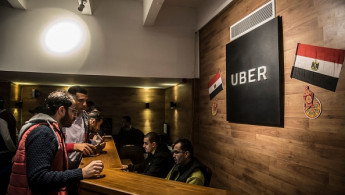Uber Egypt demands access to drivers' criminal records amid safety concerns
An Uber senior executive called on Egypt's lower house of the parliament to allow the ride-sharing company access to drivers' criminal records, almost ten days after an Uber driver had allegedly assaulted and attempted to kidnap a female passenger on the outskirts of the capital, Cairo.
During a parliamentary hearing on Monday, Ahmed Aly, Uber's Head of Public Policy, North Africa and the Middle East, said that the company failed to follow recommendations made earlier for it had not yet allowed access to the government's official databases to vet drivers, local state-run Al-Ahram newspaper reported.
The report added that representatives of the National Telecommunication Authority, the Ministry of Transport, and the parliament's Communications and Information Technology Committee participated in the heated debate.
Later in the day, the committee head, MP Ahmed Badawy, told local news outlets and satellite TV channels that the committee had made several recommendations to ensure the safety of ride-hailing apps in Egypt.
Badawy said that surveillance cameras were required inside cars and SOS activated, among other security precautions, so passengers could seek help if they were subjected to any possible violations by a driver.
Badawy added that the option of voice recording the whole trip should also be facilitated. At the same time, the audiovisual feed will be encrypted and stored in databases to be used only when needed.
The committee further called for "amending the legal definition of ride-sharing companies to transport service providers rather than digital technology companies."
"In doing so, the firms will be fully responsible for the safety of passengers," Badawy argued, adding that "they are also required to establish customer service centres linked directly to the Ministry of Transport to handle possible complaints."
It remains clear whether such terms are legally binding or recommendations expecting the final approval of the government or the parliament.
Egyptian women at stake
Several incidents involving women have in recent months sent shockwaves across the country; the latest of them was one that took place on the outskirts of Giza on the same day of the parliamentary hearing.
A 14-year-old child claimed that a local driver with a company operating in the Hadayek El-Ahram neighbourhood had sexually harassed her, which led her to jump outside the car once he slowed down.
The driver was arrested shortly afterwards and remanded in custody, pending further investigations into the incident.
No further details on the alleged heinous incident were available until publication.
Earlier this month, an Egyptian woman escaped a horrific fate after an Uber driver had allegedly assaulted and attempted to kidnap her in Cairo, ranked as "the world's most dangerous megacity for women.
The driver's lawyer has recently stepped down after "the suspect had been charged with possessing cold steel, sexual assault, and attempted kidnap of a woman" and remanded in custody pending further investigations.
Article 290 of the Egyptian penal code dictates the act of kidnapping a female, whether cunningly or forcibly, is punishable by a life sentence. If the act is accompanied by sexual assault, it could result in execution.
In April this year, a Cairo criminal court sentenced an Uber driver to 15 years in prison with hard labour after he had been convicted of the attempted abduction of 24-year-old Habiba El-Shamaa, who died after a three-week coma in the previous month.
The driver was also found guilty of possessing cannabis, driving under the influence of narcotics, and forging official identification papers to create an Uber account.
The recent incidents prompted other alleged victims to speak out about similar horrendous occurrences with ride-hailing apps in Egypt, as the hashtags "Stop using Uber" and "Uber is not safe" have gone viral for weeks.
In recent years, women across Egypt have spoken out on social media about the subject as part of the #MeToo movement, as many went public and reported such atrocities.
Incidents of sexual harassment, whether verbal or physical, are common in Egypt. But it was not until 2008 when a Cairo court sentenced a man to three years in prison in the first-ever verdict against sexual harassment of a woman in Egypt's judicial history.
Statistically, around 7.8 million Egyptian women undergo a form of gender-based violence every year, according to a UN survey released in 2015.




 Follow the Middle East's top stories in English at The New Arab on Google News
Follow the Middle East's top stories in English at The New Arab on Google News


